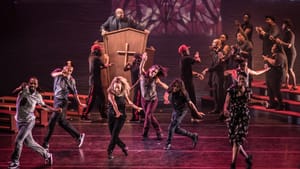Stay in the Loop
BSR publishes on a weekly schedule, with an email newsletter every Wednesday and Thursday morning. There’s no paywall, and subscribing is always free.
A prodigal son in dance
Penn Live Arts presents Rennie Harris’s Lifted

Lorenzo “Rennie” Harris has said that he was eight years old when he first saw a man get shot. He found his own salvation in the dance and music, and the religious traditions, of his North Philadelphia neighborhood, and for the past 30 years, he has been on a personal mission to see those traditions receive the respect they are due in concert dance venues. Lifted is not his first full-length narrative dance; that was Rome and Jewels in 1992. But here he brings the music and the religion he grew up with together to tell a biblical story of redemption, the prodigal son.
All under one roof
The stage was set with rows of benches, like pews, on the left and a keyboard on the right, with choir risers behind it by set designer Ben Levine. Above, stained glass windows were projected against a blue background and in the center stood a pulpit. To the contemplative music of the keyboard, the news flickered in the background: 40 rounds, it said, killed by police, as the dancers entered in freeze poses. Then the mood changed. A gospel choir filled the risers and the music picked up speed. The company—Harris’s Puremovement and the Hood Lockers dancing as church-goers—gave us joy in their fast, sharp footwork, performed in unison to “Turn My Life Around.” Reverend CJ (Carl Robinson Jr.) blurred the distinction between the house of God and house music. All under one roof, he said.
In Lifted, redemption comes in many forms, but it does not come easy. Reverend CJ gave the chapter and verse from the gospel of Luke to set up the narrative. In this version of the story, Joshua (Joshua Culbreath), the prodigal son, flees the church and the aunt and uncle who are raising him. He doesn’t know his father and misses his mother, and falls into a life of crime on the streets, picking pockets until he has a run-in with a gang of thieves danced by the Hood Lockers. The Lockers, in black track suits with a red racing stripe on the leg, shone together and in short solos, one-upping each other with acrobatics and rubber-legged splits.
The revolution was televised
Kingpin Big Poppa (Rodney Mason), draped in gold chains, asserted his credentials as a thief by stealing every scene he was in. A hip-hop remix of “Got to Pick a Pocket or Two” reminded us of the Dickens version of the story, but he was most powerful when he lorded it over his thieves with the poetry of Wadud Ahmad. The revolution was televised; you can YouTube it, he said, countering the Black Power slogan of the 1960s made famous in the Gil Scott-Heron song. The names of the dead at the hands of the police echoed through the voice-over of television newscasts. All come to nothing, he seemed to say, justifying his life of crime—good to be a king, better to be a god. But this is where the performance came to a fine point of desperation.
After decades of struggle, the poverty and death remain. Projection designer David Dowling deserves a special nod here. From the stained-glass windows that opened the show to the images of a North Philly street of rowhouses, some with boarded-up windows and doors where Big Poppa commanded his minions from the risers that became a city stoop onstage, to the facade of a great old church, Dowling drew us into Lifted’s gritty world.
A shattering moment
But ultimately, the piece succeeded most on the relationship between Culbreath’s Joshua and Robinson’s Reverend CJ, who represent the community that embraces the church and gospel music but also the house music of neighborhood social life. In “Doubt and Dolo,” Robinson sang Smokie Norful’s plaintive “I Need You Now,” while Culbreath breakdanced his longing and pain. I’ve loved Culbreath’s work in the past, but this emotional performance revealed yet another facet of his talent; his backspins seemed to clench around his heartache. Robinson reflected the same desperation in his song.
It was a shattering moment in the prodigal’s journey deeper into the underworld of Big Poppa’s den of thieves, leading to catastrophe—Joshua must prove himself by robbing the church. The climactic scene brings Robinson and Culbreath back together for a tense confrontation. The prodigal doesn’t exactly come running home, but he finds home when he gets there, turning the violence of the moment back into the young man’s pain and ultimate acceptance back into the fold. The choir sang “Amazing Grace,” and the story ended with another joyous dance by the whole company that brought the audience to its feet.
What, When, Where
Lifted. Written and directed by Lorenzo "Rennie" Harris. $35-$51. March 18 and 19, 2022 at the Zellerbach Theatre at the Annenberg Center, 3680 Walnut Street, Philadelphia. (215) 898-3900 or pennlivearts.org.
Masks, proof of Covid-19 vaccination, and a completed PennOpen Campus Green Pass are required to attend.
Accessibility
The Annenberg Center is a wheelchair-accessible venue, with a range of seating options, large-print programs, and assisted listening devices. For more info, visit the Penn Live Arts accessibility page.
Sign up for our newsletter
All of the week's new articles, all in one place. Sign up for the free weekly BSR newsletters, and don't miss a conversation.

 Camille Bacon-Smith
Camille Bacon-Smith